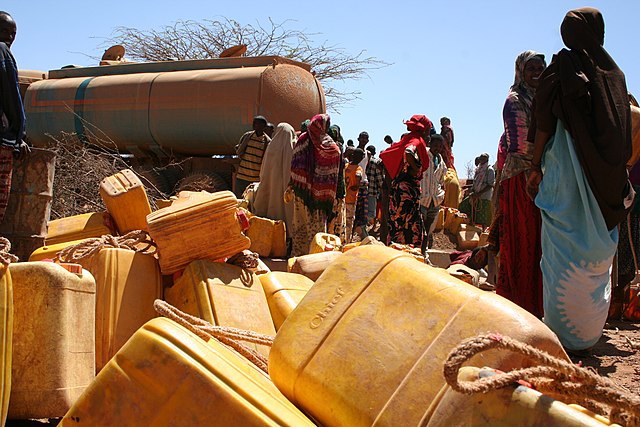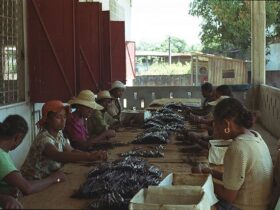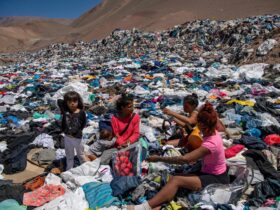The Politics of famine- Ethiopia’s truce will have to mend two years of humanitarian crisis
Oct. 24: delegations from Ethiopia’s central government and the Tigray People’s Liberation Front (TPLF) arrive in South Africa to begin peace talks. Nov. 2: the parties publicly announce a truce. Two years after the start of Ethiopia’s brutal civil war, it appears the country is ready to stop fighting.
The negotiations are just the beginning of a long and tenuous recovery process for Ethiopia, economically, socially and politically. In the short term, the peace agreement has outlined a series of transitional measures for the region. Until the next election cycle in Tigray, both parties will negotiate the appointment of an Interim Regional Administration and have agreed to create a hotline for continued political dialogue within 24 hours of the agreement.
However, inflation in Ethiopia is the highest it’s been since the 2000s, and working to rebuild and mend two years of social disarray and humanitarian crisis will demand significant and sustained recovery efforts. The Tigray war has left over 2.6 million people internally displaced, and the United Nations Human Rights Council has publicly denounced both parties as guilty of war crimes. Understanding the significance and implications of the truce means looking into the reality of the conflict and its harrowing aftermath in the northern regions.
The Tigray war began on Nov. 3, 2020 after the political group of the country’s northern region, the Tigray People’s Liberation Front (TPLF), performed strikes against a national military base. However, the causes and complexities of the civil war begin much earlier in the nation’s geopolitical history. Ethiopia has over 90 ethnic groups, exacerbating tensions and complicating power dynamics within the regional and national governments.
Background
The TPLF emerged as the political force representing Tigrayans, Ethiopia’s fourth largest ethnic population, after the fall of Ethiopia’s military regime in 1991. The group was at the forefront of the four-party coalition that dominated Ethiopian politics until 2018. The coalition faced heavy criticism for suppressing dissent and, coupled with a series of anti-government protests in 2016, led to calls for leadership changes.
This led to the appointment of Abiy Ahmed, the first ethnic Oromo prime minister.
A member of the Ethiopian People’s Revolutionary Democratic Force, Ahmed dismantled the coalition and created the Prosperity Party. He pursued a series of reform policies and received great international attention for helping negotiate a peace settlement between Ethiopia and Eritrea, winning the 2019 Nobel Peace Prize.
However, tensions between the TPLF and the central government grew when Tigray declined to join the Prosperity Party. The new government under the Prosperity Party signified a significant reduction in TPLF’s political influence.
Then, in 2020, Ahmed announced the country would be delaying the 2020 election cycle due to COVID-19 concerns. Tigray refused to cooperate, running their regularly programmed elections in August. Response from the government came swiftly, refusing to acknowledge the results and passing legislation cutting funding to the northern region.
In November, the TPLF striked national military bases, and Ahmed announced military intervention and airstrikes into Tigray. Fighting began between the TPLF and Ethiopian military, and continuously shifted between the two parties. Although a five-month truce briefly emerged in early 2021, the conflict continued to instill tensions in the region, with the central government appearing to have more resources and the upper hand. Conflict continued even days before the November truce, with reported airstrikes on Tigray.
Human rights violations
Beyond the ongoing civil conflict in Ethiopia, international debate spotlights claims of human rights abuses and accessibility to aid.
In September, the United Nations announced evidence of crimes against humanity in Tigray, including claims of starvation, rape and ethnic cleansing in the northern region. Although Ahmed’s government has strongly refuted claims of hindering humanitarian aid, the World Food Program has estimated over 5.2 million people are at risk of starvation. Not only are food shortages apparent, but the conflict has destroyed many medical centers and infrastructure in Tigray. Doctors without Borders released a statement in March 2021, citing accounts of wide-spread attacks on healthcare.
Because fighting began in the middle of the pandemic, Ethiopia has seen little to no COVID-19 recovery and support, and the lack of medical supplies has induced countless deaths from routine medical procedures and infections. According to the World Health Organization, it’s been two months since humanitarian assistance reached the region.
Furthermore, the war led to massive telecommunication blackouts and services—making it difficult for journalists and international groups to get first-hand accounts of the conflict—and challenging claims grew even more apparent after questions of Eritrean military intervention.
Ethiopia and Eritrea have a complicated history. Eritrea first declared independence from Ethiopia in 1961, and the two nations have been in conflict several times since. Most recently, the Badme war lasted from 1998 until 2000, and the two countries maintained limited diplomatic relations until Ahmed rose to power in 2018. Then, in 2021, accounts started streaming in of Eritrean forces actively involved in the Tigray conflict and supporting the Ethiopian military. Despite initial government rebuttal, the Human Rights Watch reported claims of civilian massacres by the forces in the Axum region. There was no mention of Eritrean forces in the peace-talks’ public statements.
Peace Talks and Moving Forward
The Ethiopia Peace Agreement struck many in the international community by surprise. After two years of continued fighting leading up to the African Union Peace talks there was uncertainty that the two groups would meaningfully engage. Yet, prolonged fighting and worsening humanitarian crisis seemed to have pushed the parties to the negotiating table.
According to the Agence France Presse, the head of the TPLF delegation released a statement explaining the group was willing to make concessions in order to stop and address the prolonged suffering in the northern region.
“In order to address the pains of our people, we have made concessions because we have to build trust,” Getachew Reda said.
One of the agreement’s main objectives was the protections of civilians and humanitarian access. The Ethiopian government agreed to expedite the access to humanitarian aid in the region.
The Ethiopian government also agreed to support the TPLF’s removal from Ethiopia’s terrorist organization list.
The agreement however was a big win for the Ethiopian government, with the TPLF agreeing to complete disarmament of the Tigray Defence Force within the next thirty days. Additionally, Ethiopia troops presence is set to occur in Tigray’s capital of Mekelle.
However, there are concerns regarding no mention of Eritrean forces from the peace agreement and a lack of implementary details. The African Union will be monitoring the situation, and both parties have agreed to set up a Transitional Justice Policy framework to restore order in the region.
More remains to be seen as additional information and accounts arise over the conflict, but Ethiopia will have decades of work to acknowledge the suffering the conflict has imposed over Tigray and the nation as a whole. Rebuilding trust and ensuring access to aid will continue to regenerate debate, but the party leaders appear committed to ensuring an end to the conflict. Just Nov. 12, both parties officially signed an agreement outlying the implementation of peace talks. The Declaration of the Senior Commanders Meeting on the Implementation of the Ethiopia Permanent in Nairobi released a statement disarmament will begin Nov. 15. Soon after, the Department of State reported the parties have committed to the distribution of humanitarian aid and essential services.







